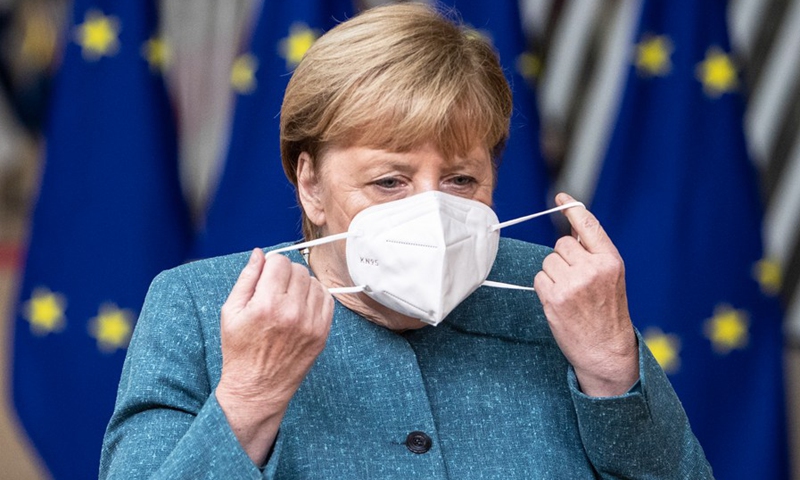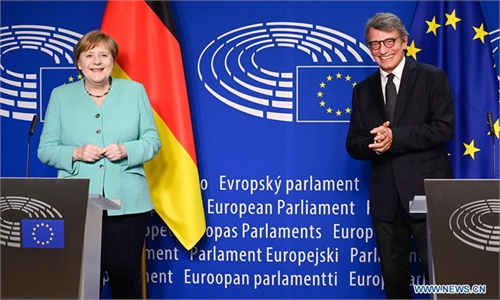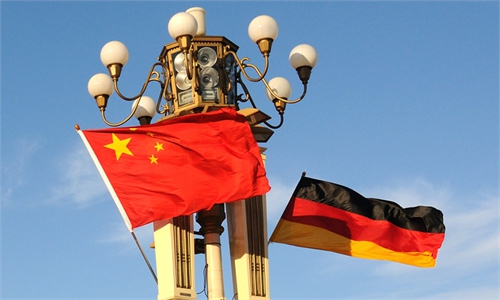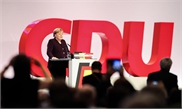
German Chancellor Angela Merkel arrives for the European Union special summit in Brussels, Belgium, on Oct. 1, 2020. (Photo: Xinhua)
After two postponements, German Chancellor Angela Merkel's Christian Democratic Union (CDU) completed the leadership change in a very German way on Saturday. After two rounds of votes, Armin Laschet, whose political style is similar to that of Merkel, was elected leader of the CDU. The leadership change of Germany's largest party reflects the current status of German politics.
Two main competitors, conservative businessman Friedrich Merz and Laschet were put on with distinctive labels before the election. Merz, a long time business man dubbed German Donald Trump, represents those who are dissatisfied with the status quo in the CDU. Meanwhile, Laschet has been a Merkel loyalist with a rich political experience in the EU, German parliament, and the local government.
Supporting Merz means getting rid of Merkel's influence and abandoning the status quo. Choosing Laschet, in contrast, means sticking to the current path: a post-Merkel era under the influence of Merkel. It's no surprise that Merz is favored by the conservatives and young people in the CDU while Laschet is backed by the party's leadership and centrists. Since it was a tight contest between Merz and Laschet, the result cannot be simply interpreted as the victory of the centrists and Merkel's allies.
In the face of a complicated domestic political situation and the pressure of parliamentary elections this year, Laschet's election is a sign that the CDU is forcibly maintaining the balance of various factions in the party, instead of proactively continuing Merkel's path.
There is an ongoing political evolution in Germany. Inside the CDU, Merz wants to continue to liquidate centralism represented by Merkel. The rise of the German Green Party, which is more popular among young people, has imposed an external challenge to the CDU. Even though Laschet's succession can temporarily maintain a balance within the CDU, it cannot stop the undercurrents under the seemingly calm German politics.
The CDU's leadership change has attracted people's attention because it is directly linked to the German parliamentary elections this year. The CDU has an overwhelming advantage compared with other parties and it is very likely to win the election, which will make the CDU's leader the successor of Merkel.
However, the current political situation in Germany is more complicated than it appears: Laschet can win in the CDU with the help of Merkel, but he will also have to deal with the fact that the support for Merkel does not automatically transform into his own support.
The CDU may face two difficult situations in the parliamentary elections. First, if Christian Social Union (CSU) leader Markus Söder wants to join the chancellor race, estrangement may emerge between the two sister parties - CDU and CSU. Second, even if CDU can successfully promote its candidate for the position of a chancellor, it will have to seek allies from other parties.
In the face of such political challenges, it is hard to say if Laschet will follow Merkel's footsteps since he will have to maintain a good relationship with different parties and ignore some differences in order to win the election.
The end of Merkel's era began with the election of her successor. The change has also provided a German version of the solution to the drastic political changes in Europe although the question of how long will the solution be effective still remains.
Germany's solution shows that the way to deal with political polarization and leadership change is not limited to dividing left and right or starting things all over again. Merkel, who has huge personal influence, will gradually fade out from the political front. It is difficult for the CDU to pick a successor with the same influence. Thus, Laschet is more like a guarder rather than a helmsman.
Indeed, Europe also needs to be prepared for the unstable consequences that will come due to the political changes in Germany. From now on, Europe needs to gradually adapt to the new normal that Merkel is no longer the face of German politics. After all, Germany will still rely on Europe for its economic interests. But it remains unknown whether the country will continue to bear more political responsibilities together with France.
The author is director of the Department of European Studies, China Institute of International Studies. opinion@globaltimes.com.cn



